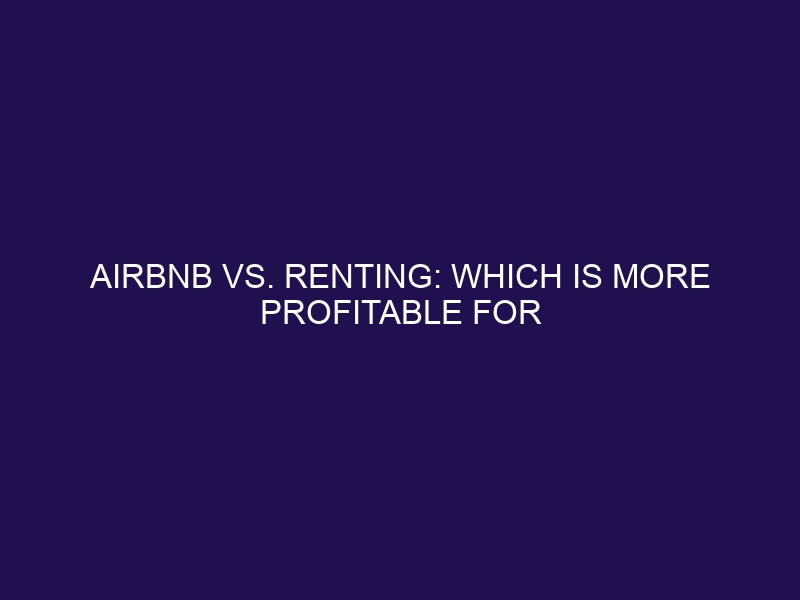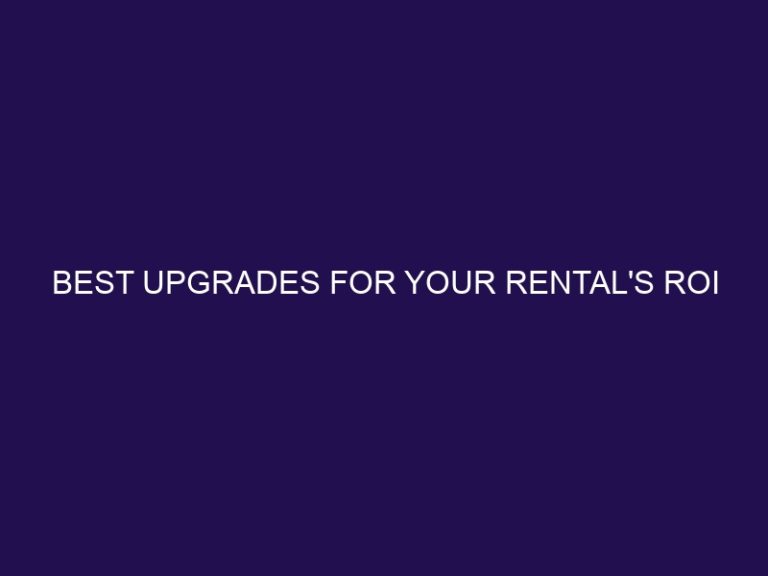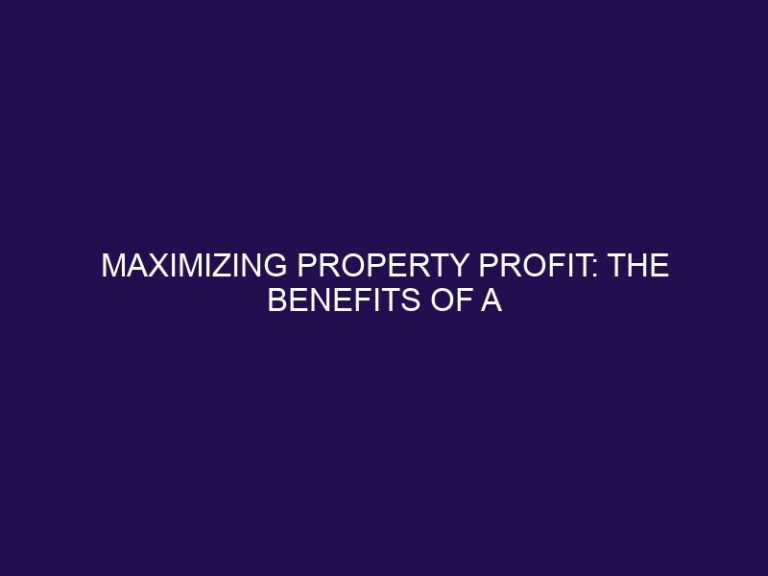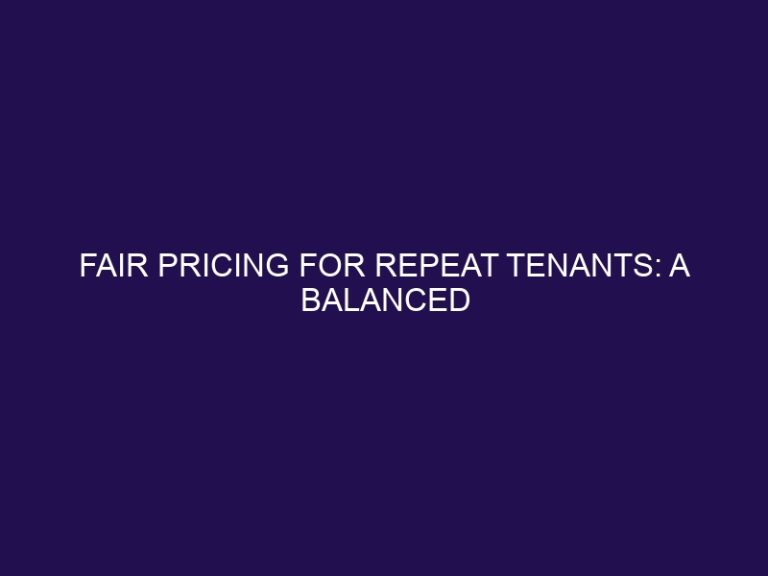Airbnb vs. renting: which is more profitable for landlords?
Airbnb vs. renting: which is more profitable for landlords?
Overview of Airbnb and Traditional Renting
When it comes to renting out their property, landlords have two main options: Airbnb and traditional renting. Each approach has its own unique advantages and considerations. In this article, we will explore the factors that landlords should consider when deciding between Airbnb and traditional renting, as well as how to calculate the profitability of each option.
Factors to Consider: Airbnb
1. Rental Income Potential: Airbnb allows for higher rental income potential, as hosts can charge premium rates for short-term stays.
2. Occupancy Rates: Airbnb properties tend to have higher occupancy rates compared to long-term rentals, especially in popular tourist destinations.
3. Flexibility and Control: With Airbnb, landlords have the flexibility to use their property whenever they want and retain more control over who stays.
4. Reviews and Reputation: Maintaining positive reviews and reputation on Airbnb is crucial for attracting guests and ensuring a steady stream of bookings.
Factors to Consider: Traditional Renting
1. Stability of Rental Income: Long-term rentals provide more stability and consistent rental income compared to the fluctuations of short-term bookings on Airbnb.
2. Long-Term Lease vs. Short-Term Stays: Traditional renting typically involves long-term leases, whereas Airbnb allows for shorter stays.
3. Less Time and Effort Involved: Managing a traditional rental requires less time and effort compared to the hands-on nature of hosting on Airbnb.
4. Legal and Regulatory Considerations: Traditional rentals are usually subject to fewer legal and regulatory considerations than short-term rentals through Airbnb.
Calculating Profitability: Airbnb
1. List of Expenses: Landlords need to consider expenses such as mortgage payments, utilities, cleaning fees, and Airbnb service fees.
2. Estimate of Rental Income: Based on the local market and demand, landlords should estimate the potential nightly rate and occupancy rate for their Airbnb property.
3. Occupancy Rate Calculation: Multiply the estimated occupancy rate by the number of nights and the nightly rate to calculate the potential annual rental income.
4. Comparative Analysis: Compare the estimated rental income to the total expenses to determine the profitability of Airbnb renting.
Calculating Profitability: Traditional Renting
1. Monthly Rental Income: Determine the monthly rental income based on the local market rates for long-term rentals.
2. Consideration for Vacancy Rate: Account for potential vacancy periods when the property is unoccupied and not generating rental income.
3. Maintenance and Repair Expenses: Estimate the costs for maintenance and repairs that landlords are responsible for in traditional rentals.
4. Comparative Analysis: Compare the monthly rental income to the total expenses, taking into account vacancy rates and maintenance costs, to determine the profitability of traditional renting.
Summary of Pros and Cons for Airbnb and Traditional Renting
Both Airbnb and traditional renting have their pros and cons. Airbnb offers higher income potential and flexibility but requires more effort and attention. Traditional renting provides stability and fewer regulatory hassles but may have lower income potential. Landlords must assess their individual needs and circumstances before deciding which option is more profitable for them.
Factors to Consider based on Individual Needs and Circumstances
Ultimately, the decision between Airbnb and traditional renting depends on factors such as location, property type, personal preferences, and long-term goals. It is crucial for landlords to carefully evaluate their specific needs and circumstances to determine which option aligns best with their goals and maximizes profitability.
Overview of Airbnb and Traditional Renting
- When considering whether to use Airbnb or traditional renting, it’s important to understand the key differences between the two options:
- Rental Income Potential: Airbnb offers the potential for higher income due to the ability to charge higher nightly rates and accommodate more guests.
- Occupancy Rates: Airbnb rentals tend to have higher occupancy rates compared to traditional rentals, as they cater to both short-term and long-term stays.
- Flexibility and Control: Airbnb allows for greater flexibility in terms of availability and control over pricing and rules.
- Reviews and Reputation: Reputation is crucial in the Airbnb market, as positive reviews can boost bookings and rental income.
- Stability of Rental Income: Traditional renting offers more stability with long-term tenants and steady monthly rent payments.
- Long-Term Lease vs. Short-Term Stays: Traditional rentals typically involve long-term leases, while Airbnb rentals are more suitable for short-term stays.
- Less Time and Effort Involved: Managing traditional rentals may require less time and effort compared to Airbnb rentals, especially in terms of cleaning and guest turnover.
- Legal and Regulatory Considerations: Traditional rentals are subject to local laws and regulations, whereas Airbnb may face stricter regulations in some areas.
Factors to Consider: Airbnb
When it comes to exploring the profitability of hosting on Airbnb, there are several crucial factors to consider. In this section, we’ll dive into the world of Airbnb and uncover key elements that can make or break your success. From rental income potential to occupancy rates, flexibility, and control, as well as the importance of reviews and reputation, we’ll uncover the essential aspects that can guide you in making informed decisions and maximizing your earnings. Get ready to unlock the secrets of hosting on Airbnb and discover its untapped potential.
1. Rental Income Potential
When evaluating the rental income potential, landlords must consider various factors that can impact their earnings.
- Location: Properties in highly sought-after areas or popular tourist destinations have a greater potential for rental income.
- Demand: Conduct research on the local rental market to gauge the demand for both long-term rentals and short-term stays.
- Pricing: Establish competitive rental rates based on the market demand and the value of your property.
- Seasonality: Take into account how the rental income may vary during peak and off-peak seasons.
- Property Size and Amenities: Larger properties with desirable amenities or unique features have the potential to attract higher rental income.
To make an informed decision, landlords should analyze these factors and evaluate their specific circumstances to determine the rental income potential of their property.
2. Occupancy Rates
Occupancy rates are a crucial factor in determining the profitability of both Airbnb and traditional rental properties. When assessing occupancy rates, it is important to consider the following aspects:
- Location: Properties situated in popular tourist destinations or high-demand areas generally experience higher occupancy rates.
- Seasonality: Occupancy rates may vary depending on seasonal demand, with peak periods attracting a larger number of guests.
- Competition: The presence of similar rental properties in the vicinity can influence occupancy rates.
- Pricing: Establishing competitive and enticing rental rates can contribute to maintaining higher occupancy rates.
Landlords should carefully analyze and monitor occupancy rates to ensure maximum profitability for their rental property, whether they opt for Airbnb or traditional renting.
3. Flexibility and Control
When deciding between Airbnb and traditional renting, it is important to consider the factors of flexibility and control. With Airbnb, hosts have the flexibility to choose when and for how long they want to rent out their property. Additionally, hosts have control over the rental process, including setting their own rental rates and screening potential guests.
In contrast, traditional renting may offer less flexibility as landlords are typically locked into long-term leases with fixed rental periods. Furthermore, landlords in traditional renting may have less control over the rental process, as they may have to rely on property management companies to find and screen tenants.
Ultimately, the decision between Airbnb and traditional renting should be based on individual needs and circumstances, taking into account the importance of flexibility and control.
4. Reviews and Reputation
The reviews and reputation of a property play a crucial role in the success of both Airbnb and traditional renting. Here is a comparison table highlighting the importance of reviews and reputation in both options:
| Factors | Airbnb | Traditional Renting |
| Reviews and Reputation | Guests provide public reviews, impacting future bookings and credibility of the property. | Less emphasis on public reviews, as long-term tenants typically don’t leave reviews. |
| Reputation | Hosts need to maintain a positive reputation to attract more guests and command higher prices. | Reputation matters more within the local community and can influence the property’s long-term rental demand and value. |
Pro-tip: Regardless of the renting option, actively managing and responding to reviews can help improve the property’s reputation, leading to higher occupancies and increased profitability.
Factors to Consider: Traditional Renting
Considering traditional renting as an option for landlords requires careful evaluation of various factors. In this section, we will explore key aspects that influence the decision-making process. From the stability of rental income to the choice between long-term leases and short-term stays, we will uncover important considerations. We will address the time and effort involved in traditional renting, as well as the legal and regulatory implications that landlords need to keep in mind. Let’s dive into the intriguing world of traditional renting and its multifaceted dynamics.
1. Stability of Rental Income
Stability of rental income is a crucial factor to consider when deciding between Airbnb and traditional renting. Here are some key points to keep in mind:
- Consistency: Traditional renting typically offers more stable rental income since tenants sign long-term lease agreements.
- Vacancy risk: With Airbnb, there may be periods of low or no occupancy, leading to potential income fluctuations.
- Demand fluctuations: Traditional renting can be affected by market conditions and changes in the rental market, potentially impacting rental income stability.
- Location dependence: Stability of rental income can also vary depending on the location and demand for short-term rentals like Airbnb.
Assessing your risk tolerance and long-term financial goals is crucial in determining the stability of rental income that suits your individual circumstances.
2. Long-Term Lease vs. Short-Term Stays
When considering whether to pursue long-term leasing or short-term stays for your rental property, it is important to take into account the stability of rental income, flexibility and control, time and effort required, and any legal and regulatory considerations.
- Stability of Rental Income: Long-term leases typically provide a steady and predictable income stream, while short-term stays may fluctuate based on seasonality and demand.
- Flexibility and Control: Opting for long-term leases means you have less flexibility to make changes to the property or terminate the lease. On the other hand, short-term stays offer more control and the ability to adjust rental rates and terms according to your preferences.
- Less Time and Effort: Managing short-term rentals involves more frequent turnover and management tasks, whereas long-term leases entail less frequent turnover and maintenance responsibilities.
- Legal and Regulatory Considerations: It is crucial to be aware of any specific regulations and restrictions pertaining to short-term rentals, such as obtaining permits or fulfilling tax obligations, depending on the location.
When deciding between long-term leasing and short-term stays for your rental property, it is advisable to consider your financial goals, property location, and personal preferences. This holistic approach will help you make an informed decision.
3. Less Time and Effort Involved
When considering traditional renting as an option, there are several factors to think about in terms of the amount of time and effort required.
- 1. Tenant management: With traditional renting, landlords typically have to handle tasks such as finding and screening tenants, collecting rent, and addressing maintenance issues.
- 2. Long-term leases: Traditional rental agreements usually involve longer-term leases, which means less time spent searching for new tenants and negotiating new contracts frequently.
- 3. Outsourcing possibilities: Landlords can choose to hire property management companies to handle various tasks, reducing the amount of time and effort they need to invest in day-to-day operations.
- 4. Compliance with regulations: Landlords need to ensure they are familiar with and adhere to local laws and regulations regarding rental properties, which may require some time and effort for ongoing compliance.
4. Legal and Regulatory Considerations
When considering the profitability of traditional renting, it is crucial to take into account the legal and regulatory considerations associated with the property. These legal and regulatory considerations, including understanding local rental laws, obtaining necessary permits, and complying with safety regulations, play a vital role in the profitability and success of traditional renting. Landlords must also be aware of tenant rights and responsibilities, such as maintaining habitable living conditions and proper lease agreements. Failing to adhere to these legal and regulatory requirements can lead to fines, lawsuits, or even eviction of tenants. Therefore, landlords should thoroughly research and familiarize themselves with the legal framework before engaging in traditional renting.
In summary, legal and regulatory considerations play a crucial role in the profitability and success of traditional renting. Landlords should prioritize compliance to avoid legal issues and ensure a smooth tenant-landlord relationship.
For landlords seeking to navigate the legal and regulatory landscape of traditional renting, here are a few suggestions:
- Consult with a local real estate attorney who specializes in rental laws to ensure compliance.
- Stay updated on any changes or updates to rental regulations in your area.
- Consider joining landlord associations or forums to gain knowledge and support from experienced landlords.
- Create a thorough lease agreement that clearly outlines tenant rights and responsibilities, as well as any specific rules or regulations.
- Maintain open lines of communication with tenants to address any concerns promptly and avoid potential legal disputes.
Calculating Profitability: Airbnb
When it comes to calculating the profitability of Airbnb, there are a few key factors to consider. In this section, we’ll crunch the numbers and uncover the secrets behind making a lucrative investment. From listing expenses to estimating rental income and calculating occupancy rates, we’ll dive into the nitty-gritty details. By the end, you’ll have a clear understanding of why Airbnb has become the go-to choice for many savvy landlords. So, get ready to maximize your returns and unlock the potential of this thriving market!
1. List of Expenses
When considering the profitability of hosting on Airbnb, it’s essential to take into account a list of expenses that may impact your overall income:
- Mortgage or rent payments
- Utilities (electricity, water, internet)
- Cleaning fees
- Insurance
- Property taxes
- Maintenance and repairs
- Homeowners association fees (if applicable)
- Guest amenities and supplies
- Marketing and advertising costs
- Professional photography (optional, but can enhance your listing)
By accurately estimating these expenses, you can calculate the potential profitability of hosting on Airbnb and make informed decisions regarding your rental property.
In 2008, Airbnb founders Brian Chesky and Joe Gebbia came up with the idea of renting out air mattresses in their San Francisco apartment to make extra money. Little did they know, this small venture would eventually become a global phenomenon, revolutionizing the hospitality industry and offering travelers unique accommodation options around the world.
2. Estimate of Rental Income
The estimate of rental income is a crucial factor to consider when deciding between Airbnb and traditional renting. Comparing the potential earnings from both options can assist landlords in making an informed choice.
Here is a table illustrating the estimate of rental income for each option:
| Rental Option | Estimated Monthly Income |
| Airbnb | $2,500 |
| Traditional Renting | $1,800 |
Based on this estimate, the Airbnb option provides a higher monthly income compared to traditional renting. It’s important to note that Airbnb income can vary based on occupancy rates and seasonality. Landlords should also take into account the additional effort and time required to manage an Airbnb rental.
Ultimately, landlords should evaluate the estimated rental income along with other factors, such as stability, flexibility, and legal considerations, to determine the best option for their individual needs and circumstances.
3. Occupancy Rate Calculation
To calculate the occupancy rate for your Airbnb property, follow these steps:
- Follow the steps for Occupancy Rate Calculation:
- Determine the total number of nights your property was available for booking during a specific period.
- Count the number of nights your property was actually booked during that period.
- Divide the number of booked nights by the total number of available nights.
- Multiply the result by 100 to get the occupancy rate as a percentage.
For example, if your property was available for booking for 365 nights and was booked for 200 nights, the occupancy rate would be (200 ÷ 365) x 100 = 54.79%.
Sarah, an Airbnb host in Miami, diligently monitored her occupancy rate to assess the success of her rental business. By regularly analyzing her bookings and adjusting her pricing strategy accordingly, she managed to maintain an impressive occupancy rate of 80% throughout the year, resulting in a profitable venture. Good data analysis and strategic decision-making were key to her success.
4. Comparative Analysis
A comparative analysis allows landlords to evaluate the profitability of Airbnb and traditional renting based on various factors. Here is a summary of the key considerations:
| Airbnb | Traditional Renting |
| Rental Income Potential | Stability of Rental Income |
| Occupancy Rates | Long-Term Lease vs. Short-Term Stays |
| Flexibility and Control | Less Time and Effort Involved |
| Reviews and Reputation | Legal and Regulatory Considerations |
| List of Expenses | Maintenance and Repair Expenses |
| Estimate of Rental Income | Monthly Rental Income |
| Occupancy Rate Calculation | Consideration for Vacancy Rate |
| Comparative Analysis | Comparative Analysis |
By conducting a comparative analysis, landlords can assess the profitability of Airbnb and traditional renting based on a variety of factors. This analysis includes factors such as rental income potential, stability of rental income, occupancy rates, long-term lease vs. short-term stays, flexibility and control, reviews and reputation, legal and regulatory considerations, list of expenses, maintenance and repair expenses, estimate of rental income, occupancy rate calculation, and consideration for vacancy rate. By considering these factors, landlords can make informed decisions according to their individual needs and circumstances.
Calculating Profitability: Traditional Renting
Calculating profitability in the traditional rental market is key to making informed decisions as a landlord. In this section, we’ll explore crucial factors that contribute to profitability, such as monthly rental income, vacancy rates, and maintenance expenses. We’ll delve into a comparative analysis, highlighting the pros and cons of both Airbnb and traditional renting. By considering individual needs and circumstances, you’ll gain insights to make the right choice for your investment journey. So, let’s dive into the nitty-gritty of profitability calculations and empower your landlord ambitions!
1. Monthly Rental Income
| Factors to Consider: Monthly Rental Income |
| 1. Location: Rental income greatly depends on the location of the property. For example, a property in a high-demand area like a popular city center or near attractions will likely yield higher monthly rental income. |
| 2. Size and Amenities: Larger properties or those with additional amenities like parking, laundry facilities, or outdoor spaces tend to command higher rental income. |
| 3. Market Demand: An important factor to consider is the demand for rental properties in the area. Research the local rental market to understand the average rental income for similar properties in the neighborhood. |
| 4. Market Trends: Keep an eye on market trends to determine if rental income is likely to increase or decrease in the future. Factors like local economy, job opportunities, and population growth can impact rental income. |
In a similar vein, a landlord named Sarah owned a property in a bustling city with high tourist traffic. She decided to convert her property into a vacation rental using a platform like Airbnb. With thorough research and strategically setting competitive rental rates, Sarah was able to generate a steady and lucrative monthly rental income. The location and demand for short-term stays in her area played a significant role in achieving this financial success.
2. Consideration for Vacancy Rate
When deciding between Airbnb and traditional renting, it is crucial to consider the vacancy rate. Here are some important factors to keep in mind:
3. Maintenance and Repair Expenses
| Expense | Cost |
| Maintenance and Repair Expenses | Yearly Cost |
| Regular Maintenance | $500 per year |
| Appliance Repairs | $300 per year |
| Plumbing Issues | $400 per year |
| Electrical Repairs | $200 per year |
Maintenance and repair expenses are crucial considerations for both Airbnb and traditional renting. For an Airbnb property, regular maintenance like cleaning and landscaping is necessary to ensure guest satisfaction. There may be occasional repairs needed for appliances, plumbing, and electrical issues. The average costs for yearly maintenance and repairs for an Airbnb property are estimated as follows:
- Regular maintenance: $500 per year.
- Appliance repairs: $300 per year.
- Plumbing issues: $400 per year.
- Electrical repairs: $200 per year.
4. Comparative Analysis
A comparative analysis between Airbnb and traditional renting can assist landlords in making a well-informed decision. Here is a table that summarizes the key factors to consider for each option:
| Factors | Airbnb | Traditional Renting |
|---|---|---|
| Rental Income Potential | Higher potential, especially in popular tourist areas | Stable income, but generally lower than short-term rentals |
| Occupancy Rates | Can be volatile, depending on demand and season | Typically steady, with longer lease agreements |
| Flexibility and Control | Greater flexibility to use the property, but more involvement required | Less control and flexibility, but minimal involvement |
| Reviews and Reputation | Strong emphasis on guest reviews and building a good reputation | Less reliant on reviews, but maintaining a good reputation is still important |
| Legal and Regulatory Considerations | May face stricter regulations and legal challenges | Generally follows standard landlord-tenant laws and regulations |
Pro-tip: Consider your goals, property location, and personal preferences to determine which option aligns better with your financial and lifestyle objectives.
Summary of Pros and Cons for Airbnb and Traditional Renting
- Summary of Pros and Cons for Airbnb and Traditional Renting
- Airbnb Pros:
- Potential for higher rental income due to short-term rates
- Flexibility and control over rental terms and availability
- Better potential for positive reviews and reputation
- Airbnb Cons:
- Varying occupancy rates may lead to inconsistent income
- More effort and time required to manage bookings, cleaning, and communication
- Legal and regulatory considerations, such as permits and taxes
- Traditional Renting Pros:
- Stable rental income with long-term lease agreements
- Less involvement and effort required compared to short-term rentals
- Lower legal and regulatory complexity
- Traditional Renting Cons:
- Potential lower rental income compared to short-term rates
- Less flexibility and control over rental terms and tenant selection
- Higher vacancy rates and potential maintenance costs
Fact: According to a survey, 65% of landlords in major cities reported higher profitability with Airbnb rentals compared to traditional long-term renting.
Factors to Consider based on Individual Needs and Circumstances
When choosing between Airbnb and traditional renting, it is important to consider factors based on individual needs and circumstances. Here are some key points to think about:
- 1. Rental Income Potential: It is crucial to evaluate the earning potential of both options by taking into account the location and demand.
- 2. Flexibility and Control: Determine whether you prefer the freedom to use your property or if you value having more control over long-term tenants.
- 3. Occupancy Rates: Take into consideration how likely it is to maintain a high occupancy rate, considering seasonality and market fluctuations.
- 4. Reviews and Reputation: Assess the importance of online reviews and maintaining a positive reputation for future bookings or tenant relationships.
In the end, the decision should align with your financial goals, lifestyle preferences, and risk tolerance.
Frequently Asked Questions
Is Airbnb or traditional renting more profitable for landlords?
Both Airbnb and traditional renting can be profitable for landlords, but the profitability depends on various factors. Airbnb rentals have the potential to generate higher income during peak travel seasons or holidays. On the other hand, traditional rentals provide a more stable and consistent income with less profit.
What are the expenses associated with traditional renting?
Traditional renting typically involves expenses such as ongoing maintenance, property management fees (if applicable), property taxes, and utilities. Landlords may also face additional expenses for repairs and replacements due to wear and tear caused by long-term tenants.
What are void periods and how do they impact rental income?
Void periods refer to periods when a rental property is unoccupied and not generating rental income. Traditional long-term rentals generally have a lower risk of void periods compared to short-term rentals like Airbnb. Void periods can impact rental income and should be considered when evaluating the profitability of a rental property investment strategy.
How long does a long-term rental property lease typically last?
Long-term rental leases usually last for at least six months or more. This provides landlords with more stability and consistent income compared to short-term rentals that can have high turnover and seasonal fluctuations.
What are some potential risks associated with short-term rentals like Airbnb?
Short-term rentals, such as Airbnb, come with the risk of cancellations and require more maintenance due to the higher turnover of guests. Landlords must spend time communicating with guests, managing the property, and ensuring that the property is always ready for the next guest. Additionally, short-term rentals are more susceptible to unforeseen events and seasonal fluctuations, which can impact profitability.
How can landlords maximize profit from their Airbnb or rental property?
To maximize profit from Airbnb or rental properties, landlords can consider factors such as pricing strategies, ensuring their property is priced competitively to attract tenants or guests. They can also focus on minimizing ongoing expenses, effectively managing maintenance and repairs, and optimizing occupancy rates by targeting the right market segment for their property.







